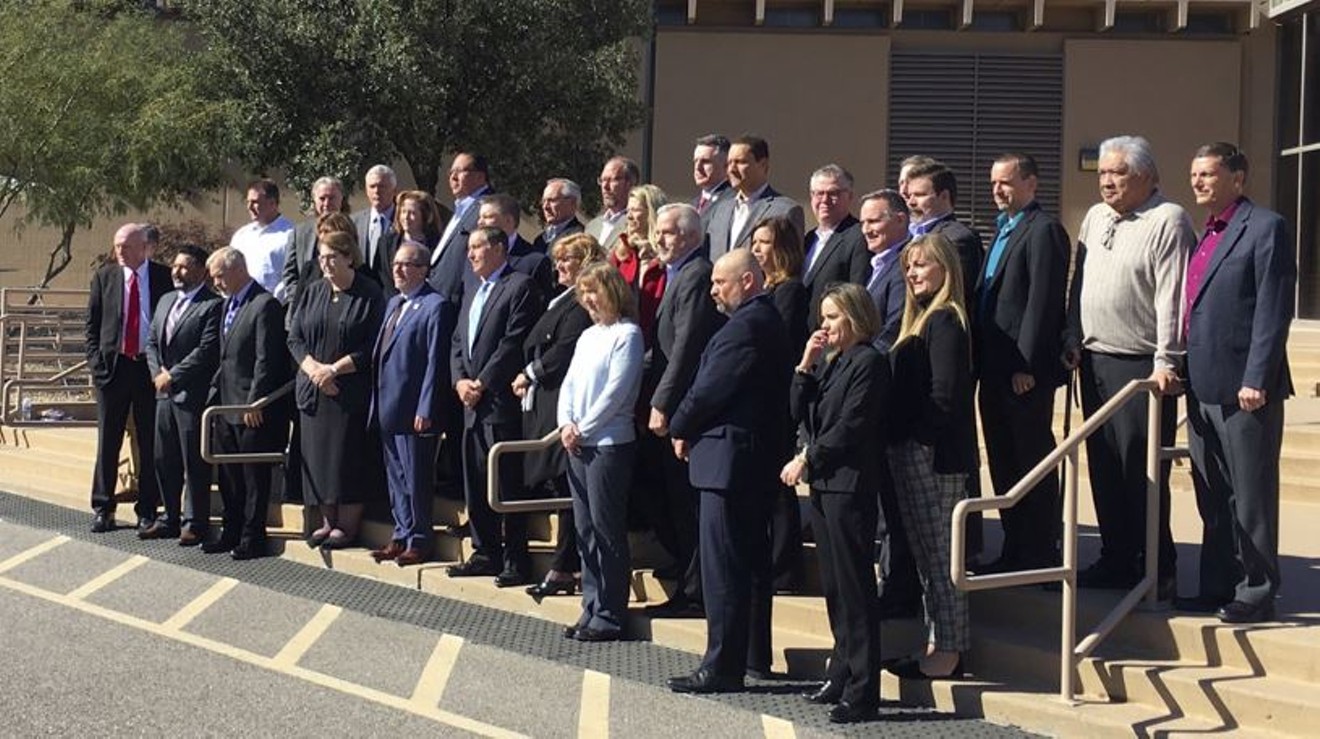A muted celebration settled over Arizona’s final meeting on its Colorado River drought plan on Tuesday, even though more than a dozen agreements remain unfinished and a federal deadline is less than two weeks away.
"I want to sincerely congratulate all the Steering Committee members," said Leslie Meyers, the Phoenix area manager for the Bureau of Reclamation, referring to the 40 or so people who negotiated the Drought Contingency Plan over more than six months of intense talks. "I’m really proud to have been a part of this."
Meyers, as well as other negotiators, acknowledged that the plan wasn’t finished. “We are absolutely committed to finishing the agreements that were outlined,” she added.
Yet another shadow hanging over the drought plan is a controversial bill, HB 2476, which has prompted the Gila River Indian Community to threaten to withdraw from the drought plan. Gila River leaders see the proposed legislation as undermining their water rights.
On Tuesday afternoon, the House Natural Resources, Energy, and Water Committee held the bill after hearing testimony on it. Don Pongrace, a lawyer for the Gila River Indian Community, said it was not clear how the committee's decision would affect the tribe's stance on the Drought Contingency plan.
“We’re going to consult with those who are more knowledgeable about the Arizona legislative process," he said. After that, the tribe would decide whether the committee's holding the bill would be "sufficient" for it to reconsider signing on to Arizona's drought plan.
The Bureau of Reclamation has given Arizona and California, whose Imperial Irrigation District also has not approved the plan, until March 4 to complete their drought plans.
Arizona missed the first federally imposed, January 31 deadline to complete its Drought Contingency Plan. That day, the state passed legislation for it to sign an interstate drought plan, and it tweaked laws to allow farmers, cities, tribes, and other groups to exchange water as needed under the drought plan.
But it still has not finished the various agreements necessary to implement those water exchanges.
Arizona has 13 agreements that are still in draft or concept form. A wide range of people and agencies have to sign off on them, including the Arizona Department of Water Resources, the board of the Central Arizona Project, irrigation districts, the Gila River Indian Community, the Colorado River Indian Tribes, the Southern Nevada Water Authority, the Salt River Project, the Bureau of Reclamation, various cities, and still others “TBD.”
Only three agreements have been finalized.
If states do not finish a Drought Contingency Plan, the Department of Interior will take over. Brenda Burman, the commissioner of the Bureau of Reclamation, has said that on March 4, the bureau will start accepting recommendations from the governors of the seven Colorado River basin states for actions that the department could take.
Leaders of Arizona’s drought planning say they aren’t sure what exactly that means.
“We do not have a clear list of what needs to be completed by that date,” Ted Cooke, general manager of the Central Arizona Project and a co-leader of the drought negotiations, told reporters after the meeting. He also called March 4 an “artificial deadline,” saying that Arizona had met its obligations for the interstate drought plan on January 31.
[
{
"name": "Air - MediumRectangle - Inline Content - Mobile Display Size",
"component": "18478561",
"insertPoint": "2",
"requiredCountToDisplay": "2"
},{
"name": "Editor Picks",
"component": "16759093",
"insertPoint": "4",
"requiredCountToDisplay": "1"
},{
"name": "Inline Links",
"component": "17980324",
"insertPoint": "8th",
"startingPoint": 8,
"requiredCountToDisplay": "7",
"maxInsertions": 25
},{
"name": "Air - MediumRectangle - Combo - Inline Content",
"component": "16759092",
"insertPoint": "8th",
"startingPoint": 8,
"requiredCountToDisplay": "7",
"maxInsertions": 25
},{
"name": "Inline Links",
"component": "17980324",
"insertPoint": "8th",
"startingPoint": 12,
"requiredCountToDisplay": "11",
"maxInsertions": 24
},{
"name": "Air - Leaderboard Tower - Combo - Inline Content",
"component": "16759094",
"insertPoint": "8th",
"startingPoint": 12,
"requiredCountToDisplay": "11",
"maxInsertions": 24
}
]












